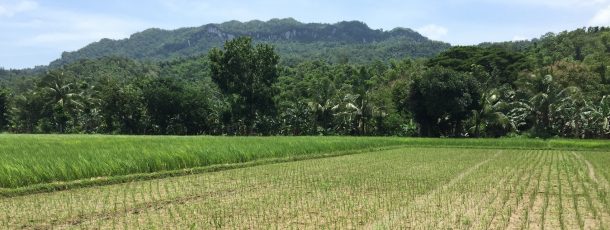Food for Life: Growth of a Different Kind
In the 2-years since Food for Life began, a marketplace ministry initiative of Kabuganaan Philippines Ministries (KPM) in partnership with Canadian Baptist Ministries (CBM), a lot has developed. During the first year of operation, one of the initial objective was to have a well established organization of farmers and farm workers from Capiz province, led by a core group of local leaders. Food for Life’s desire was to see the livelihood of farmers and farmer workers improved, thus ending the cycle of debt that many of them were stuck in. Although there were many challenges in that first year, Food for Life achieved its initial goal and is now a strong organization with solid local leadership.
During the second year, the Food for Life leadership team has been focusing on learning new techniques in rice farming, in particular, the System for Rice Intensification (SRI), which is proven to produce much higher yields of rice that withstand harsh weather better than traditional methods. In addition, the team has begun exploring the production of organic inputs such as soil enrichers, organic fertilizers, and organic pesticides. By implementing SRI technology and organic farming, Food for Life will move closer to achieving another of its goals – the production of healthy, chemical free food for the people of Capiz province.
One of the challenges in introducing new farming techniques is the uncertainty that farmers have in changing from what they know (traditional methods of farming) to what they do not know (SRI and chemical free farming). In an attempt to help farmers overcome their uncertainties and fears, Food for Life is establishing four demonstration farms throughout Capiz province. These ‘demo’ farms will provide local farmers and farm workers the opportunity to follow the cycle of rice farming from field preparation all the way through to harvest, which will go a long way in helping them overcome their uncertainty and fears about adopting SRI and chemical free farming techniques.
On Saturday, I had the opportunity to visit two of the ‘demo’ farms to observe the implementation of the SRI protocols and to monitor the growth of the rice since planting began. One of the fields was planted 14 days ago, while the other was planted 30 days ago. It was amazing to see the difference in growth in just a few weeks since my last visit.
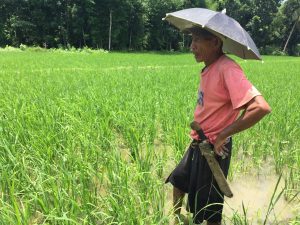
A local farm worker from Duran took the time to explain the process of weeding between the rice plants and the importance of flooding the field with water throughout the duration of the growing cycle. He was wearing a great umbrella hat to keep the hot sun off his face while he worked.
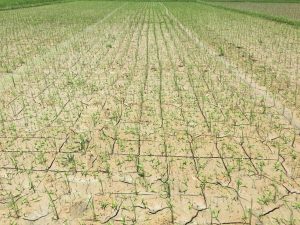
This field was planted 14 days ago. You will notice that the field is dry and in need of weeding. In order to weed the field the farmer will flood with water, which will soften the soil making it easier to weed.
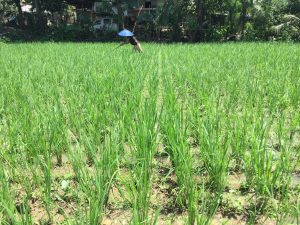
This field was planted 30 days ago. As you can see, there is a big difference between the 14 and 30 day fields. In the distance, a farm worker is pushing a manual rotary weeder to remove the weeds from between the rows – such hard work!
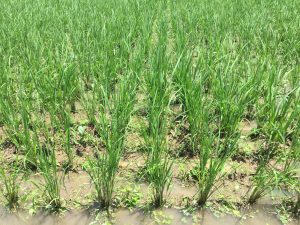
Notice the water in the field at the bottom of this picture? During our visit the farmer was pumping water onto the field from a nearby spring because there has not been enough rain lately to cover the field. Farmers will flood their fields with water for approximately 3-4 days, which will enhance the growth.
During the second crop cycle of 2019 (Oct/Nov), Food for Life with the support of CBM, will be expanding into phase two. This will bring an additional 10 hectares (representing approx. 10-12 additional farmers) of rice production into Food for Life, the full implementation of SRI for new and existing members of Food for Life, and the building of a production facility (laboratory). This will give Food for Life the ability to mass produce organic farm inputs, which will provide a secondary revenue stream that will further benefit the members of Food for Life. There is much more we could share about the Food for Life initiative, but we will save that for another post.
The Food for Life project would not have gotten off the ground if not for the generous financial support of Canadian Baptist like yourself who faithfully support and pray for the ministries of CBM and our partners around the world. Please continue to uphold the ministries of our partner, KPM, and especially Food for Life, as we begin phase two in the weeks and months ahead.
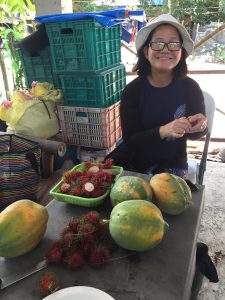
One of the highlights of visiting farms during this time of year in the Philippines is the abundance of fresh tropical fruits. Phoebe Santiago (seen above) and I were treated to a wonderful lunch of fresh fruits such as Rambutan, Papaya, Marang, and Lansones. Such a treat!
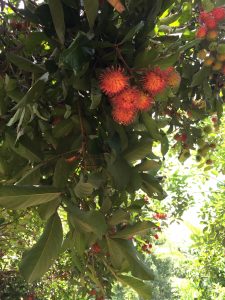
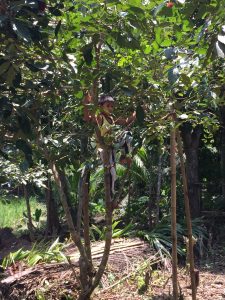
For more information on CBM’s work around the world, including the Philippines, or to donate please visit www.cbmin.org or call 1-905-821-3533.
If you are interested in becoming a Partner-in-Mission with our family, please contact Barb Keys (bkeys@cbmin.org or call 1-905-821-3533) at Canadian Baptist Ministries. You can also visit their website at www.cbmin.org to give online or for more information. We are only able to follow God’s leading in our lives thanks to the monthly support of generous individuals and churches.
All donations of $10.00 or more will receive a charitable tax receipt at year end.
Thank-you!
Michael & Melanie
Kyla, Sean, Carter & Allie

